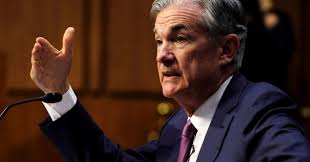Fed Chair Says He’s Hearing ‘a Rising Chorus of Concerns’ from Companies About Trump’s Trade Wars

For the past few months, U.S. companies have been sounding the alarm on the impact that the Trump administration’s trade wars will have on their businesses. Now those concerns are being echoed by Federal Reserve Chairman Jerome Powell, whom Trump appointed to the job in February.
Powell spoke to reporters Wednesday after the Federal Reserve raised interest rates for the third time this year and indicated it would keep raising rates into 2019. Asked about the impact that Trump’s tariffs could have on the well-being of American companies, Powell shared concerns he’s been hearing from executives.
“We’ve been hearing a rising chorus of concerns from businesses all over the country about disruption of supply chains, materials cost increases,” he said Wednesday. “If this, perhaps inadvertently, goes to a place where we have widespread tariffs that remain in place for a long time, a more protectionist world, that’s going to be bad for the U.S. economy.”
Trump didn’t respond to Powell’s comments on trade, but he has been openly critical of the Fed’s decisions to keep lifting interest rates higher under Powell’s tenure. In August, he reiterated he wasn’t “thrilled” about the moves, which are meant to stave off the risk of inflation in a strong economy. Following Wednesday’s rate increases, Trump spoke with reporters himself and said, “I am not happy about” the higher rates, adding that he’s “worried about the fact that they seem to like raising interest rates.”
Financial markets tend to prefer that central banks maintain an independence from politics. And while trade tariffs may not be the normal purview of the Fed, Powell was addressing a concern echoed by critics of tariffs: They can push prices higher, adding to the inflationary pressures that can result from companies paying higher wages to fill positions in a tight job market.
Powell told reporters that the Fed isn’t seeing those kinds of inflationary pressures from higher wages, or even from higher tariffs. Trump’s harshest tariffs to date—a 10% import tax on $ 200 billion in Chinese goods—went into effect on Monday. Even before then, some U.S. manufacturers likely to be hurt by the tariffs have been either laying off workers or planning to move manufacturing plants abroad.
Powell was also asked about Trump’s criticism of the Fed’s interest rate policy. He didn’t address Trump directly but stoically restated the central bank’s independence from the fray of politics. “We’ve been given a really important job to do,” he said. “We don’t consider political factors.”


